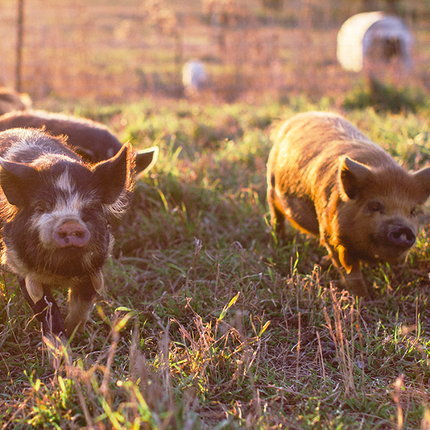Hogs have become the heart of Matt and Emely Hendl’s home operation in Milford, Nebraska.
Originally found in New Zealand, KuneKune (pronounced cooney cooney) pigs have been the perfect fit for this farm family for the past four years.
“We wanted to raise a pig that would do well on pasture so we could feed our family with organic-type practices in mind,” said Emely. “At first, we had a Berkshire cross hog and they were tough on fencing and our pasture. When we discovered KuneKune and their calm presence, along with the fact they are a pasture pig, we knew this was the right homestead pig for us.”
The Hendls raise approximately 90 hogs, including breeding sows, breeding boars, and meat pigs to grow out. The hogs forage on pasture cover crops from March through December and live on other feed during the remainder of the year, eating about 2 pounds of soaked feed from the local co-op each day. In the coldest months, they eat flakes of fourth-cutting alfalfa, sunflower seeds, heads of cabbage, and their regular feed. In between those times, the Hendls grow two gardens to supplement themselves and the pigs.
“Friends love giving us all the pumpkins and squash that they can in the fall, which is like chocolate cake to the pigs,” Emely said. “Thirty-six full-grown pigs do not even come close to damaging or rooting up the 2.75 acres they are on.”
Through a collaboration with another farmer, Emely and Matt have found a specific market for the KuneKune pigs.
“A close pig pal and I have created a slightly larger and faster-growing KuneKune,” said Emely. “We have obtained something called 200 in12, which is 200 pounds in 12 months. Registered breeders have been highly sought-after from our two farms. Anyone wanting a different type of hog that has a bit of patience and wants family-friendly pigs to raise seeks out the KuneKune.”
For the meat aspect of the hogs, the Hendls take their KuneKune into a trusted facility that understands their smaller niche hog. The end result is worth the hard work the farm family puts into raising them.
“Their meat is as red as a beef steak and is marbled with their fat perfectly,” said Emely. “It’s nutritionally dense due to being on pasture 100% of the time. We love selling whole hogs to customers as well as individual cuts available in our little farm shop on site.”
Emely said farmers who are considering raising hogs should do plenty of research first.
“We’ve made a lot of expensive mistakes,” she said. “Find a breeder who will also be a mentor to you, and who has a dual purpose program like meat sales and registered piglet sales. Not every piglet in the litter is worthy of registering. KuneKune take time to grow, but the end result is so unbelievably worth it. The taste and quality of the pork is unreal.”
The Hendls are doing everything they can to help others learn from their experiences.
Matt and Emely will join the Center for Rural Affairs as guest speakers for the Center’s classes for military veterans in agriculture starting in February. “A Year in the Life” will run through September and consist of six online and five on-farm sessions with online alternatives. “Putting the Pieces Together: A Year in the Life of a Diversified Farm” offers 13 sessions of online classes and in-person production sessions from January through November for veterans interested in pursuing agriculture.
“We are a veteran family who has never really farmed before,” Emely said. “My husband loves tending to his beehives and producing raw honey for us and our customers. Our daughter loves the chickens and helping me with the pigs. After moving around while my husband was in the Navy for 20 years, we’re thankful to call Milford and our tiny farm our home.”
If you’re interested in more information or would like to attend these workshops, contact Kirstin Bailey at [email protected] or visit our events page.
Feature photo: KuneKune pigs that reside on the Hendl farm | Center file photo





